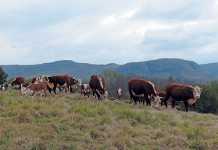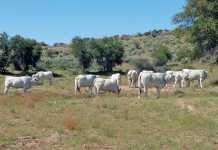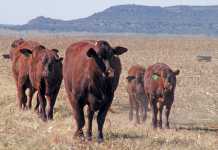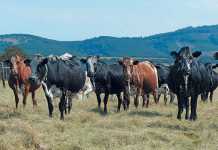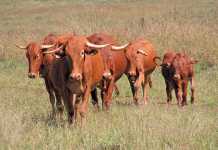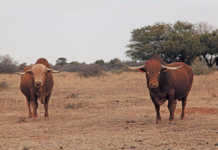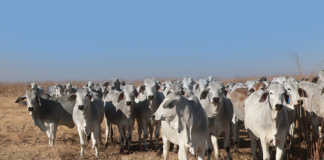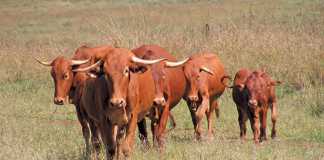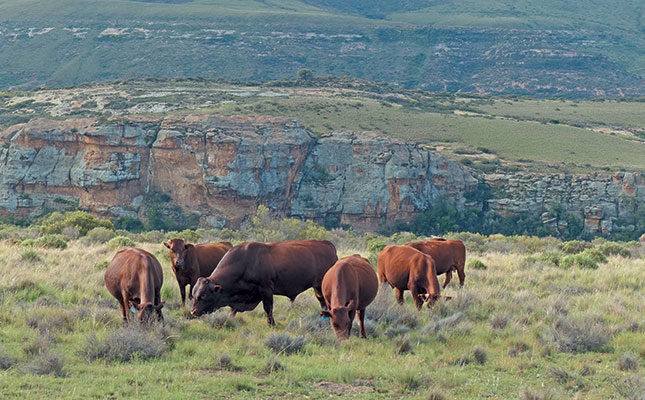
Cornel van Heerden (34), the Transvaal Agricultural Union’s (TAU’s) Young Farmer of the Year for the Eastern Cape had to start from the bottom. “I got nothing for free,” he says.
Cornel, who was recently elected vice-chairperson of the Dordrecht TAU regional branch for 2017, did not inherit land, but today farms on approximately 4 000ha between Barkly East and Lady Grey with 390 Bonsmara females and 200 Merino ewes.
After matriculating, he started working for his father, Johan, in 2000 and was paid in part with livestock. Cornel added these to a handful of cattle Johan had given him while he was still at school as an incentive to farm.
Eventually, in 2006, Cornel purchased the 1 000ha family farm Vaalkop in the Bonthoek, and today rents another 3 000ha from his father, who is retired and lives on La Vanier farm.
Cornel immediately committed himself to running Bonsmaras because the breed can handle the area’s very rugged terrain and mixed veld.
“I farm Bonsmaras because they climb our mountains – they get right to the top,’’ he explains.
The Bonsmara’s docile temperament is another advantage for Cornel. He employs only two workers and therefore needs a breed that is easy to handle and does not require chasing after.
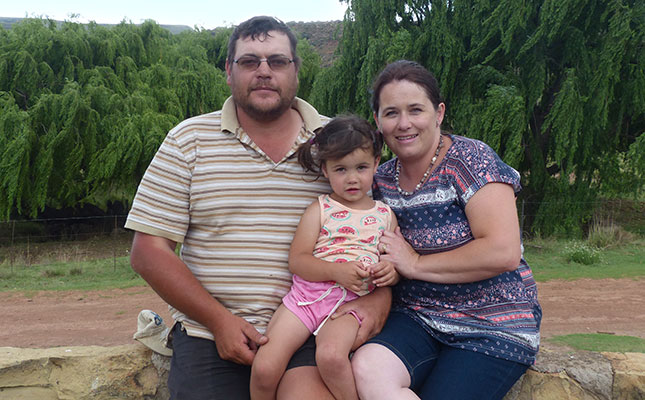
On average, Cornel’s mature cows weigh between 450kg and 550kg. Heifers enter the herd at an annual rate of 25% to 30% and are put to the bull at an average age of 18 months for four months from November to February.
Cows are mated for three months, from December to February. Selected females that fail to conceive are put to the bull again in March/April to calve in winter, when they are assisted with lucerne, oats or wheat, depending on the season. Cornel has 120ha under fodder crops.
Calving
The Bonsmaras’ average calving rate was 75% to 80% before the drought. Since then, it has dropped to 60%. Cornel says, however, that this rate should be understood within the context of his management. The herd is farmed extensively, – with minimal inputs – and heifers and cows calve on the veld, with the exception of selected skips that are returned to the bull.
Cattle receive a lick that includes salt, molasses, Molatek’s Meester 20, sulphur and bone meal throughout the year.
“My cattle survive on the veld with a lick. They don’t get special food,’’ says Cornel. “They eat what the veld provides.’’
He buys his bulls mainly from Kenny Brown (KTB Bonsmaras) and Wayne Shuman (Cloetedale Bonsmaras) in the Waqu area between Cathcart and Queenstown in the Eastern Cape.
A bull used on a group of heifers will continue to be run with them as cows until it is culled; this strategy ensures that no inbreeding occurs. Calves are weaned between six and seven months, with heifers weighing on average between 200kg and 210kg and bull calves weighing between 210kg and 220kg
Cutting costs
Cornel’s principal aim in his operation over the past few years has been to decrease costs. While increasing the size of his Bonsmara herd, he has reduced the size of his labour-intensive sheep operation over the past five years from 3 000 to just 700, which includes about 200 breeding ewes.
Predation and theft also contributed to this decision. Nevertheless, Cornel stresses that he will never abandon sheep farming entirely – not only for sentimental reasons, but for their valuable contribution to cash flow throughout the year.
“If wool has crept into your heart, it stays there,’’ he says. “With sheep, your cash flow is just a lot faster.’’
He currently produces 16 bales of wool annually with an average fibre diameter of 21,5 microns. Rams are sourced from Stefan Nel (Bergplaas Merino Stud, Barkly East), Pat and Sarel Vorster (Morriston Merino Stud, Barkly East) and Mike Fitzhenry (Navar Merino Stud, Indwe).
Cornel also saves considerable costs by repairing his own tractors, implements and vehicles.
“I hardly ever use a garage except if I buy a new vehicle and they service it within its service plan,’’ he says. “After the service plan, I service them.’’
Cornel is still driving a Toyota Land Cruiser his father bought in 1978, while he has resurrected two more old Land Cruisers for use on his rugged properties, especially during fire season.
He also builds and modifies implements rather than buying new ones.
“I can’t afford to spend R50 000 or R100 000 on an implement,’’ he says. “I’d rather come home and sit at the drawing board and use what I have. I cut up and break down old implements and build new ones.’’
A difficult road
Looking back at his farming career, Cornel says that it has been tough, but rewarding.
“My father always said to me that before you can be a boss you need to have worked like a worker. You can’t just walk into a farming operation and want to be the boss.
If you start from the bottom and work hard, and remember where everything came from, you’ll be a success.”
Although Cornel says that he had always focused on relying as little as possible on others, he does sometimes wish that he had someone to partner with.
“Before I can argue with a guy about doing something, I must be able to do it better,’’ he says. “Sometimes I wish I had a brother because the business would have been a lot stronger.’’
According to Cornel, his toughest challenge has been the increasingly severe droughts.
“I’ve gone through more dry years than wet years,’’ he says. “If I didn’t have my wife to speak to, I wouldn’t have made it.’’
In fact, his most serious concern for the future is changing weather patterns.
“When I was young, a lot of people planted wheat in the Swempoort and Bonthoek areas because of the mist rain,’’ he says. “Now all that mist rain is gone and not a kernel of wheat is produced in these areas anymore.”
Besides droughts, there were major veld fires in 2003 and 2014 that destroyed large portions of Cornel’s veld. The latter was perhaps the more serious; Cornel lost 1 000ha and the associated loss of grazing made it very difficult in what was an exceptionally dry year.
But despite the hardships, he could never see himself in fixed employment and talks enthusiastically about how he starts and ends his days strolling amongst his calving heifers to glimpse the new arrivals.
“You do get gatvol sometimes,” he says. “But I couldn’t do an office job. There’s no comparison between that life and this one.’’
Phone Cornel van Heerden on 087 550 1045.

